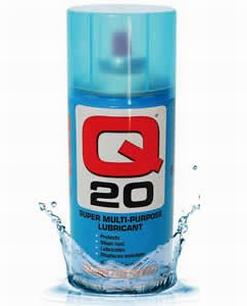
Q20: another successful SA invention
There’s the dolos and the Kreepy Krauly, both popular and proudly South African inventions – among many more – but who knew that a South African was also responsible for the development of that magic liquid in a can, Q20? Back in 1950 in Pinetown, KwaZulu-Natal, a certain Mr Robertson was discussing with his neighbour the wonderful new liquid […]

There’s the dolos and the Kreepy Krauly, both popular and proudly South African inventions – among many more – but who knew that a South African was also responsible for the development of that magic liquid in a can, Q20?

Back in 1950 in Pinetown, KwaZulu-Natal, a certain Mr Robertson was discussing with his neighbour the wonderful new liquid substance which he had just invented. It was an effective water repellent, kept rust at bay, eased squeaky door hinges, and made it easy to release rusted or seized nuts and bolts.
Apparently he did not know what to call it but he told his neighbour that it certainly had 20 answers to 20 questions.
Inadvertently Robertson had just coined the name of one of the most widely used and loved products for the South African office, workshop and household environment, and one which would set the standard for all subsequent similar products from around the world.
At about the same time that Robertson made his discovery, the Volkswagen Beetle was being rolled off the production line for the very first time at the Volkswagen plant in Uitenhage, Eastern Cape.
This car would become both a family favourite and student icon over time, but it had one particular and rather annoying drawback: it was unreliable in rainy weather because the distributor cap was easily penetrated by water and would then stop working.
The Beetle was also a backyard invention in a way, because the first three cars were manufactured in creator Ferdinand Porsche’s garage in December 1934.
Perfect for Beetles
Little did Robertson know just how handy his invention, now known as Q20, would be for Porsche’s quaint little vehicle. With the first Beetles hitting South African roads in August 1951, Q20, with its excellent water repelling properties, was soon widely in use around the country.
“The product was initially aimed to displace water from the distributor caps on the old VW Beetle, which was notorious for stalling in wet weather,” confirms Simon Smith, marketing manager for Triton-Leo, the company that manufactures the product.
The additional benefits of rust prevention and lubrication for which Q20 is also widely applied, were “added bonuses”, adds Smith.
The special secret behind Q20, says Smith, is that it is heavier than water. Once Q20 is sprayed on water, it sinks to the bottom, where it acts as a water displacer and lubricant on the problem area.
The science behind it is simple enough. Since oil floats on water, simply oiling the area will not resolve the problem. But because Q20 has a specific gravity of 1.154, it can displace water which only has a specific gravity of 1.
“This gives Q20 superior lubricating properties, almost double that of the closest competitor, as tests conducted by the South African Bureau of Standards have proven.”
A growing brand
Of course, trust humans to make liberal and creative use of Q20 for other purposes as well. Rumour has it that the product is very popular in Zimbabwe, South Africa’s northern neighbour, where it is used for arthritis. And a certain gentleman in the Free State province is known to use it as an alternative to shaving cream.
Of course, more conventional diversification of the Q range has also taken place over the years and the company now offers eight niche products for lubrication, rust prevention and other uses.
Whatever the application, today Triton-Leo sells more than 1.5-million cans in South Africa alone, and has achieved a 70% market share. This has provided opportunities for overseas expansion, and since 2010 the company has successfully ventured into this competitive market. About 100 000 cans per year are sold across Africa, Europe and South-east Asia.
“We have achieved phenomenal growth over the last three years, in excess of 100% over the period,” says Smith.
The company also recently changed its package design so that it is more user friendly and complies with Reach (registration, evaluation, authorisation and restriction of chemicals), the European legislation for chemical regulation.
In South Africa Triton-Leo is the official Q20 supplier to the South African National Defence Force and Air Force, the South African Police Service, and Correctional Services, responsible for prisons around the country.
In 2010 Q20 ventured into the tough American market for the first time. Succeeding here is no mean feat as WD40, developed in the US in 1954, is the world leader in this product category and still holds top spot in many countries.
The company is in the process of establishing a manufacturing plant in the UK to service its European customers.
“We have proven that if we manage to get a can of Q20 into the end user’s hand they very seldom change back to the competitors’ products,” says Smith.
Source: www.mediaclubsouthafrica.com
By: Emily van Rijswijck
